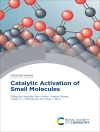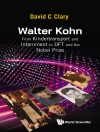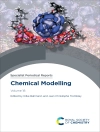Meeting the desire for a comprehensive book that collects and curates the vast amount of knowledge gained in the field of singlet oxygen, this title covers the physical, chemical and biological properties of this reactive oxygen species and also its increasingly important applications across chemical, environmental and biomedical areas.The editors have a long and distinguished background in the field of singlet oxygen chemistry and biomedical applications, giving them a unique insight and ensuring the contributions attain the highest scientific level.The book provides an up to date reference resource for both the beginner and experienced researcher and crucially for those working across disciplines such as photochemistry, photobiology and photomedicine.
Inhoudsopgave
Overview of Reactive Oxygen Species;
Properties of Singlet Oxygen;
Water-Soluble Carriers of Singlet Oxygen for Biological Media;
Production of Singlet Oxygen by Direct Photoactivation of Molecular Oxygen;
Photosensitization;
Reference Photosensitizers for the Production of Singlet Oxygen;
The Sensitized Production of Singlet Oxygen Using Two-Photon Excitation;
Activatable Photosensitizers;
Heterogeneous Singlet-Oxygen Sensitizers;
Production of Singlet Oxygen by Nanoparticle-Bound Photosensitizers;
Endogenous Singlet-Oxygen Photosensitizers in Mammalians;
Endogenous Singlet-Oxygen Photosensitizers in Plants;
Genetically Encoded-Singlet Oxygen Photosensitizers;
Singlet-Oxygen Generation by Drugs and Their Metabolites;
Nanofibers and Nanocomposite Films for Singlet Oxygen-Based Applications;
Photochemistry in Supercritical Fluids;
Remote Singlet Oxygen-Delivery Strategies;
Overview of the Chemical Reactions of Singlet Oxygen;
Singlet Oxygen as a Reagent in Organic Synthesis;
Reactions of Singlet Oxygen with Nucleic Acids;
Reactions of Singlet Oxygen with Membrane Lipids: Lipid Hydroperoxide Generation, Translocation, Reductive Turnover, and Signaling Activity;
Reactions of Singlet Oxygen with Organic Devices;
Singlet Oxygen-Mediated Photodegradation of Water Contaminants
Over de auteur
Santi Nonell is Fellow of the Royal Society of Chemistry and Professor of Physical Chemistry at the Institut Quimic de Sarria (IQS), University Ramon Llull, Spain. He earned a doctorate in photochemistry for work carried out at the Max-Planck-Institut für Strahlenchemie in Mülheim an der Ruhr (Germany) under supervision of Silvia Braslavsky. After a postdoctoral period visiting the Arizona State University (Tom and Ana Moore) and the University of California Los Angeles (Chris Foote), he returned to Spain to join the faculty of the IQS. He is co-author of over hundred peer-reviewed publications on singlet oxygen spectroscopy and chemical aspects of photodynamic therapy. He currently serves as Deputy Editor-in-Chief of the RSC journal Photochemical & Photobiological Sciences and is member of the Executive Committee of the European Society of Photobiology.
Cristina Flors is a Principal Investigator at the Madrid Institute for Advanced Studies in Nanoscience (IMDEA Nanoscience), Spain. Following her degree in Chemistry, she completed her Ph D at the Institut Químic de Sarrià in Barcelona in 2004 under the supervision of Prof. Santi Nonell. Her work focused on singlet oxygen photosensitization by phenalenone derivatives and on singlet oxygen detection using fluorescent probes. In 2005 she moved to the laboratory of Prof. Johan Hofkens at the Katholieke Universiteit Leuven, Belgium, to learn single-molecule and super-resolution fluorescence microscopy. She began her independent research career at the University of Edinburgh in 2008, and in 2012 moved to IMDEA Nanoscience in Madrid. She is interested in the ability of fluorescent proteins to photosensitize singlet oxygen, as well as in super-resolution fluorescence microscopy.












